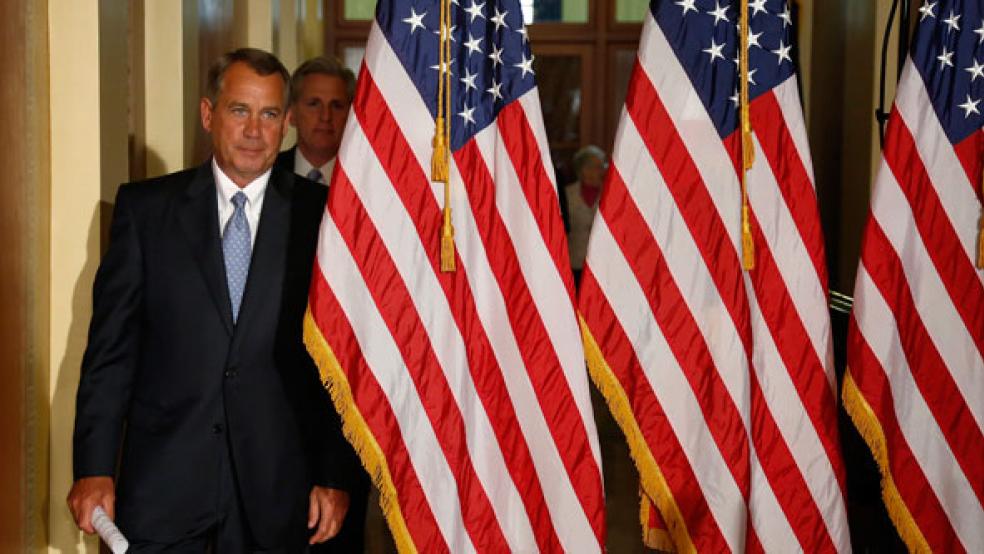For the third straight year, Congress plans to push its big budget decisions back to Christmas. After President Obama squandered their first week back from August recess over the possibility of bombing Syria, congressional leaders are brushing up against some urgent deadlines.
The new fiscal year starts on Oct. 1, meaning that the government would stop operating without a stopgap in place. A few weeks after that, the Treasury Department projects that the government will max out its $16.7 trillion borrowing authority and risk an historic default unless the debt ceiling is raised. It will take the better part of the rest of the year to sort out all the differences over spending levels for the coming year, whether to preserve or eliminate the sequester, and how to placate Republicans trying to derail Obamacare.
Adding to the turbulence and time pressure this fall will be uncertainty over President Obama's choice of a successor to Federal Reserve Board Chairman Ben Bernanke. Former Treasury Secretary Lawrence H. Summers, the president's top choice, pulled out of the running on Sunday in the face of growing opposition from liberal Democrats, women's groups and other advocacy groups.
Obama has said he was considering two other candidates for the job -- Fed Vice Chairman Janet Yellen and former Fed vice chairman Donald Kohn. But Obama could broaden his search as he gauges Democratic and Republican sentiment on the Hill.
THE BOEHNER CHRONICLES
Once again House Speaker John Boehner (R-OH) could not persuade his own caucus to pass a measure that would keep the government running through mid-December. He pulled a vote Wednesday on the continuing resolution that would keep the government running through mid-December, after dozens of GOP lawmakers objected to how easily the Senate could override their defunding of Obamacare.
Boehner was vague as to how he could tease out a solution that satisfies his members, Senate Democrats, and the Obama administration.
“We're working with our colleagues to work our way through these issues,” he said on Thursday. “I think there's a way to get there. I'm going to be continuing to work with my fellow leaders and our members to address those concerns.”
In other words, the top-elected Republican official just called an audible, after having his playbook torn up. Obama expressed confidence on a deal with Russia to take away Syria’s chemical weapons, but the toughest negotiations for his administration might be within this split GOP.
THE OBAMA CHRONICLES
“There are ways of doing this, it’s just that they haven’t been willing to negotiate in a serious way on that. What I haven’t been willing to negotiate, and I will not negotiate, is on the debt ceiling,” Obama told ABC News in an interview broadcast Sunday. “And when it comes to budgets, we’ve never had the situation in which a party said that– you know, ‘Unless we get our way 100 percent, then– we’re gonna let the United States default.’”
“It’s not just that the Democrats and the Republicans are divided, but the Republicans are divided among themselves so badly that I don’t know who the White House is supposed to negotiate with,” said Stan Collender, a budget expert and former congressional staffer who now works for Qorvis Communications.
Boehner had crafted a continuing resolution that was meant to deflect claims that Republicans would shutdown the government, symbolicly oppose Obamacare, and trim spending slightly. The bill would have continued spending through Dec. 15 at an annual level of $986.3 billion, while making some adjustments for veterans, firefighters and border security.
It seemed like a good deal for conservatives: Spending would be well below the $1.043 trillion spending level that Congress agreed to last March for the remainder of fiscal 2013.
But Boehner and other House leaders were forced to pull back the CR on Wednesday and reschedule the vote for the following week after many conservative members and outside groups complained that it wasn’t good enough.
The fatal flaw, according to many GOP lawmakers, was that the Senate Democratic leadership could easily separate out the Obamacare provision and then vote on the new short-term spending level. With the government health insurance exchanges set to begin enrollment on Oct. 1, the next few months are viewed as the lest best chance to stop the 2010 Affordable Care Act, the formal name for Obamacare.
The conservative groups Club for Growth, Heritage Action and FreedomWorks announced their opposition to the plan within hours of its unveiling at a closed-doors Republican meeting last week.
Lawmakers sympathetic with these groups deem Obamacare to be more of an economic threat than a government shutdown. They want to force a presidential veto, while many Republican House leaders—with an eye toward the polling—see this as a negotiating ploy that would backfire.
“I don’t want to see a shutdown of the government,” said House Appropriations Committee Chairman Hal Rogers (R-Ky.) told Politico. “And I don’t think anyone believes the president would sign a bill that defunds Obamacare under that kind of scenario.”
Waiting until next week is not fatal for the House, but it is illustrative of Boehner’s seemingly endless struggle to satisfy his fractious conference. In the face of all the other problems confronting Congress – including Syria, immigration reform, food stamps and agriculture subsidies – passing a short term funding bill should not be a heavy lift.
Rep. Tom Graves (R-GA) already put forward an alternative with more than 40 co-sponsors. His bill would fund the government at roughly similar levels but postpone and defund Obamacare through 2015.
None of these options are enticing to Democrats—who want the continuing resolution to hold spending at a constant level of $1.058 trillion, under the belief that deeper spending cuts would hurt economic growth.
White House Press Secretary Jay Carney warned last week that lawmakers should not engage in more activities that impose “self-inflicted wounds” on the economy.
Senate Majority Leader Harry Reid (D-NV) told reporters that GOP efforts to undermine Obamacare are a “waste” of time. “Let’s stop playing these really juvenile games,” he said.
The expectation still remains that Democrats and Republicans will find a way to sort through their differences, as they did in 2011 with the previous debt ceiling increase and last year with the fiscal cliff.
“We’ll solider through on this,” said Bill Hoagland, senior vice president of the Bipartisan Policy Center. “It looks a little bleak right now, but I don’t think there’s anybody that truly wants there to be a government shutdown. And at the end of the day I think there will be sufficient votes for a [continuing resolution] in the House and in the Senate.”
So the American economy might avert disaster, but in all likelihood it still could be a disappointing Christmas morning with the eventual deal inovlving spending cuts that do little to address long-term debt issues.
“Given the range of competing fiscal visions in the Beltway, the easiest solution to overcoming the current fiscal impasse may be to agree to disagree,” said Bank of America economist Joshua Dennerlein in a recent client note. “The path of least resistance looks a lot like it did last spring: token upfront spending cuts in exchange for lifting the debt ceiling and passing a continuing resolution to keep the government running.”






